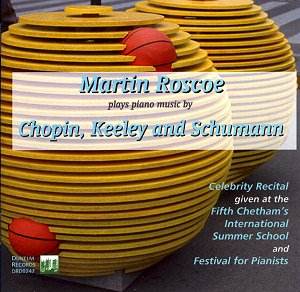Though there is little audience noise, and none that disturbs or
distracts, there is a real sense of the 'live' about this CD; it
has that indefinable sense of music happening the once and once
only.
Roscoe is a well-established pianist of wide and well-deserved
reputation. Those who have enjoyed such recordings as his
Szymanowski Naxos series, works by Dohnanyi on ASV and Hyperion or
the concertos by Fuchs and Kiel (also on Hyperion) will surely
approach this recital with confidence, knowing that they will
encounter musicianship of a high order. Roscoe is not, for good or
ill, an international star of the jet-setting kind, who sells
tickets by his or her personality as much as for the sake of the
music being played; he is an intelligent, clear-headed and
accurate-fingered performer who can be relied upon to put himself
unostentatiously at the service of the music he plays. He does so
here, to good and enjoyable effect.
Chopin's Ballade No. 1 gets a sound and perceptive performance;
without exaggeration, Roscoe brings out and clarifies the patterns
of contrast which structure the work. He finds a good deal of
appropriate sentiment in the gentler passages and can handle the
louder and faster passages with accuracy and a certain fire. The
overall shape of the Ballade is never subordinated to its detail,
something which can easily happen. Not perhaps one of the all-time
great or memorable performances of this much played and much
recorded piece, but very well worth the hearing and making a firm
foundation for the recital.
We most often think of each Chopin Ballade in the context of that
composer's other similarly-titled works. Here it exists in a rather
different context, since it is followed by a performance of the
Ballade by the British composer Robert Keeley, for which the Chopin
exists as a point of reference. The booklet notes quote from
Roscoe's spoken introduction at the time of the recital: "it is
about the same length as Chopin's first Ballade, but it does not
have the same intensity, which was never the intention. It shares
the same common-time lilt for the most part and certainly has the
same contrasts with moods. It finally arrives at a very intense
climax". Again there are clear patterns of contrast and there is at
times a knowing allusiveness which incorporates distinctively
Chopinesque effects. But Keeley's piece is far from being mere
pastiche; it has a characteristic voice of its own, with some
attractive lyrical writing that works in ways distinctly unlike
Chopin. Roscoe puts the case for this piece - which I don't
otherwise know - persuasively.
The recital ends with Schumann. There is compelling playing here
and the bottom end of the piano comes across particularly well in
the recorded sound. But Roscoe can, of course, also play with
winning delicacy. The effects in Schumann's eight fantasies can
sometimes sound like effects without real causes; they don't here.
The sequence coheres as a study in personality, the detail only
part of a purposeful whole.
It may sound like a kind of damning with faint praise to say that
Martin Roscoe is a reliable, unflashy pianist. It isn't meant to.
What one can rely on with Roscoe is that he will not seek to impose
a quirky or excessively individual reading on the music. The
unflashiness means that he doesn't seek to draw attention to his
own technical triumphs, simply (though of course it may often be
far from simple to do so) to play, intelligently and accurately,
without gesturing to us to say "isn't this difficult music and
aren't I playing it well?". These are real and substantial virtues
and they can be heard and enjoyed on this disc.
Incidentally, I wonder if any thought was given to including
Roscoe's spoken introductions on the CD? There would certainly have
been space, they would surely have been of interest and could
readily be programmed out by the listener who didn't want to hear
them on each playing of the CD. As it is the playing time is
relatively meagre, but that need not be a reason to give this CD
anything other than a warm welcome.
Glyn Pursglove
See also reviews by Ian Milnes (
http://www.musicweb-international.com/classrev/2005/Dec05/Roscoe_DRD0247.htm)
and William Kreindler (
http://www.musicweb-international.com/classrev/2006/Jan06/Roscoe_DRD0247.htm)


